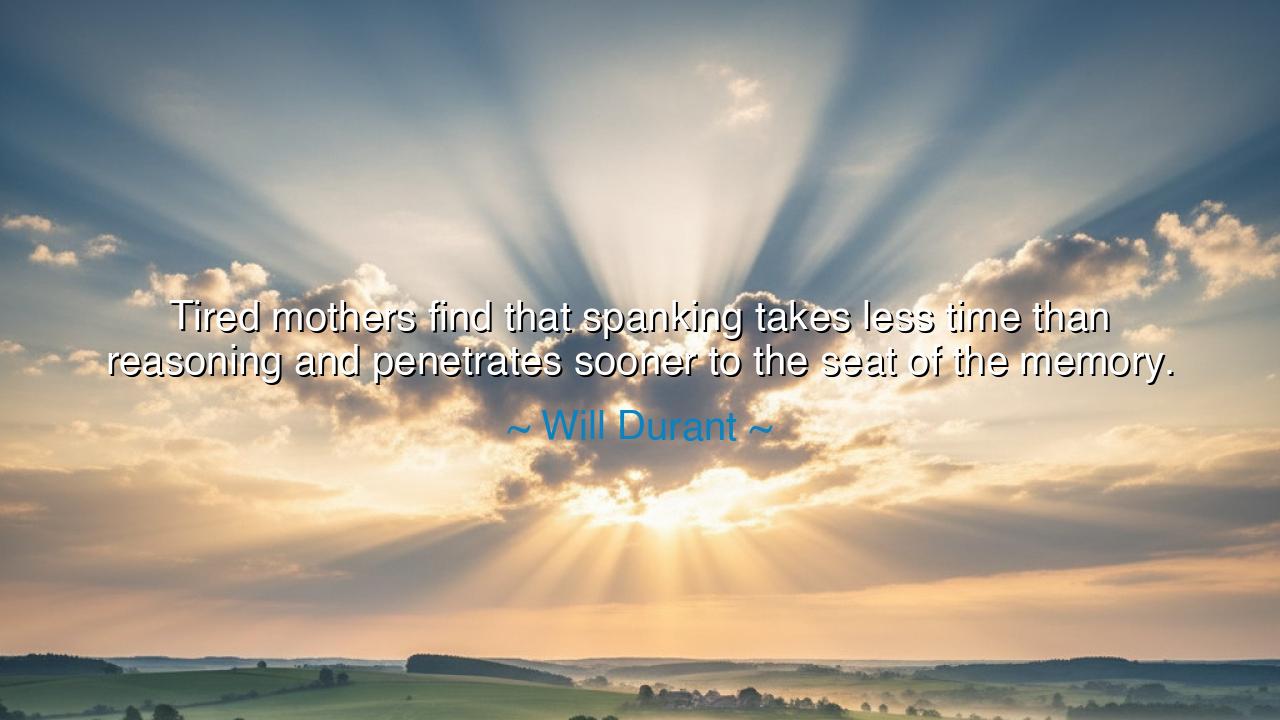
Tired mothers find that spanking takes less time than reasoning
Tired mothers find that spanking takes less time than reasoning and penetrates sooner to the seat of the memory.






Hearken, O seekers of reflection, to the sharp yet compassionate wisdom of Will Durant, who wrote: “Tired mothers find that spanking takes less time than reasoning and penetrates sooner to the seat of the memory.” Beneath this wry observation lies an ancient tension — between patience and exhaustion, between reason and reaction, between the gentle art of teaching and the swift force of discipline. Durant, historian and philosopher of civilization, knew that the shaping of a child’s character mirrors the shaping of humanity itself: it is a battle between impulse and understanding.
In the quiet heart of motherhood, there burns both endless love and finite strength. The tired mother — weary from days of ceaseless care, sacrifice, and unseen labor — may sometimes reach for expedience over reflection. The act of spanking, in Durant’s phrasing, becomes not a symbol of cruelty, but of human limitation. It is the quick remedy of one who loves deeply but has little left to give in that moment. It is not the failure of love, but the fatigue of devotion — a reminder that even the wisest and gentlest hearts grow weary when their labor is constant and their rest is rare.
The ancients, too, knew this truth. In the writings of Confucius, the parent who teaches through harmony and example is praised above all, yet even he admitted that discipline without rest and support can harden into frustration. Durant’s insight carries that same note of empathy. He sees in the mother’s moment of impatience not condemnation, but tragedy — that a world which exalts the nurturing woman rarely honors her exhaustion. The spanking is not merely physical correction; it is the symbol of a civilization that has yet to ease the burdens of its caregivers.
Consider the story of Susanna Wesley, mother of John and Charles Wesley, founders of Methodism. She raised nineteen children, educating each with rigor and care, and held that discipline was the path to moral strength. Yet she, too, confessed in her letters to moments of despair and impatience, praying for divine help to temper her hand when fatigue clouded her judgment. Her honesty mirrors Durant’s truth: the greater the responsibility, the heavier the toll, and the finer the line between guidance and frustration. Through such stories, we see that wisdom and weariness often dwell together beneath the same roof.
Durant’s words, though laced with irony, point toward compassion — for both mother and child. To reason with a child requires time, calm, and patience; to strike, a mere instant. Yet the quick path, though memorable, does not nurture understanding; it plants fear where wisdom might have grown. The true lesson, then, is not a moral condemnation of the mother, but a recognition of the need to support her — to create conditions in which reasoning is possible, where love has room to breathe and patience has time to flourish.
The philosophical root of Durant’s statement lies in his broader vision of civilization: that progress depends upon the mastery of impulse by reason. The family, he believed, was the cradle of all virtue, and the mother its first philosopher. When reason fails within the home, it is not the fault of the individual alone, but of a society that leaves her isolated in her labor. Thus, every civilization must learn that to nurture its children, it must also nurture those who raise them.
From this reflection rises a clear and enduring lesson: patience is the slow but enduring path to wisdom, while exhaustion breeds shortcuts that wound the spirit. Therefore, those who share the burdens of life must learn to share the burdens of care. Let fathers, families, and communities support the weary heart of the mother; let they who guide the young remember that teaching through love endures far longer than correction through fear.
And so, let the teaching echo across generations: to raise a child is to shape the future, and to shape with gentleness is to build a civilization of peace. The tired mother does not need judgment; she needs rest, understanding, and partnership. For only in a world where she is strengthened can her reasoning outlast her weariness, and her love — which is already divine — become the foundation of all that is good and enduring in humankind.






AAdministratorAdministrator
Welcome, honored guests. Please leave a comment, we will respond soon